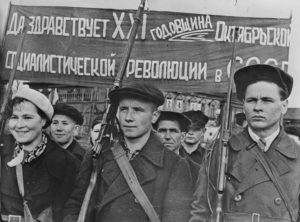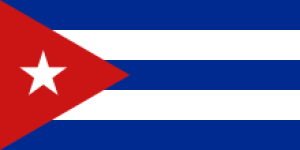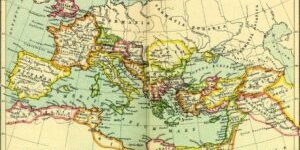The Failed Dream Of A Russian Revolution
No Comments yetaljazeera.com Exactly one hundred years ago today, in the evening of October 25, 1917, the Winter Palace in Petrograd (today’s St Petersburg) was stormed. This event marked the beginning of the Great October Revolution, one of the most significant political events of the twentieth century that shaped the course of history for decades ahead.
Leading up to the events of October 25 was another revolution in late February 1917, which brought to power a group of leaders from bourgeois political parties that formed a provisional government headed initially by Georgy Lvov, a liberal reformer, and then by Aleksander Kerensky, a socialist. In early March of that year Tsar Nicholas II, who had ruled imperial Russia since 1894, abdicated. Five months later, Russia was pronounced a republic.
Although the provisional government did introduce some reforms on the political front, prompting even Bolshevik leader Vladimir Lenin to declare Russia in April 1917 “the freest country in the world”, it was the Red October Revolution that turned the old order completely upside down by inaugurating a socialist regime and making Soviet-style communism a global ideological and political force that lasted until the fall of the Berlin Wall in 1989 and the subsequent collapse of the Soviet Union at the end of 1991.
Still, one hundred years later, the rise of the Bolsheviks to power continues to divide scholars, the chattering classes and even the educated public. There are several issues that are particularly divisive, such as whether the October Revolution was a popular insurgency or essentially a coup, and whether Stalinism evolved naturally from the basic principles and political strategies of Lenin or was an unexpected development.
Likewise, there is still a great deal of ambiguity, disagreement and confusion over the nature of the regime that flourished in the Soviet Union after Lenin’s death in 1924. For example, did the Soviet Union represent an “actual socialist society”, a “degenerated workers’ state”, or simply a “totalitarian state economy” in which the communist ideology functioned as a mere instrument of political legitimisation and imperial rule?
When it happened, the Great October Revolution produced global hysteria, untamed enthusiasm and hope about the possibility of the creation of heaven on earth (a new utopia) in equal measures. For the bourgeois classes everywhere, the inauguration of the Soviet regime was anathema to core values of the “western civilisation”, while for radicals and communists it signified a natural culmination of the inevitable march of history towards human freedom and a social order devoid of exploitation.
No room for mourning or celebration
On the centenary of the Great October Revolution, an objective evaluation on socialism and the legacy of Soviet communism gives no room for mourning or celebration. It was essentially the epic story of an impossible dream that turned in due time into a political and historical nightmare because of the interplay of a vast array of factors that included “backward” socioeconomic conditions, outside intervention, an absence of democratic traditions, and misconceived notions about socialism and democracy. Hence, while you can easily romanticise about the October Revolution, the cold reality of history smacks you in the face.
For starters, the Great October Revolution was unlike the February Revolution which erupted as a result of spontaneous action by hundreds of thousands of hungry and angry men and women workers and militant troops. What happened in October 1917 was the outcome of a well-designed strategy on the part of the leader (Lenin) of a minority party (the Bolsheviks) to wrest control from the provisional government because of a strong ideological aversion to “bourgeois democracy” and desire for power. Unsurprisingly Lenin’s call for “all power to the Soviets” ended up being something entirely different: all power went to the party and its politburo.
The October Revolution was not a coup in itself, but neither was it a popular uprising that enjoyed the kind of mass support that the February Revolution had. In fact, it was not until the autumn of 1917 that Lenin’s “land, peace, bread” slogan had been embraced by some workers in St Petersburg and Moscow.
Yet, even this does not mean that the Bolshevik programme and Lenin’s ideas of rule were accepted by the majority of the Russian people: In the November 1917 elections, the first truly free election in Russian history, Lenin’s party received only one quarter of the vote, while the Social Revolutionaries managed to receive over 60 percent.
Lenin had stomach neither for parliamentary democracy nor for sharing power with any other political organisation. His unwavering intent to establish socialism in Russia, regardless of the ripeness of the social and economic conditions, and his firm conviction that only the Bolsheviks represented the true interests of the workers, would compel him to adopt strategies and policies that would soon deprive the Revolution of whatever potential it had originally had for the establishment of a new social order based on workers’ control of the means of production and democracy (which Lenin, sadly enough, associated with the “dictatorship of the proletariat”).
Indeed, not long after the November elections, Lenin would ban several opposition newspapers and unleash a campaign of “Red Terror” against all class enemies (with the Social Revolutionaries being the first victims following their uprising in Moscow in early July 1918). The orchestration of the “Red Terror,” which lasted until the end of the Russian civil war, was assigned to Cheka (a Bolshevik police organisation that reported to Lenin himself on all anti-communist activities), thereby laying the foundations for the emergence of a full-fledged police state under Stalinism.
The clearest illustration of how far to the “right” the Bolsheviks had moved following the outbreak of the October Revolution is the brutal repression of the Kronstadt rebellion in 1921 by Red Army troops. Disheartened by the Bolsheviks’ dictatorial tendencies, a garrison of the key fortress of Kronstadt revolted in March 1921 against the communist government and the ideas of “war communism” – even though the Kronstadt sailors had been, back in 1917, among the strongest supporters of the October Revolution and the idea of “Soviet power”. To be sure, they were, until then, in Lev Trotsky’s own words, “the pride and joy of the revolution”.
With the suppression of the Kronstadt rebellion, it became clear that Lenin’s concept of the “vanguard party” and his understanding of the “dictatorship of the proletariat” did not permit dissent of any kind and that a socialist political order was to be based on one-party rule.
As for the policy of “war communism”, it ended a complete disaster. Lenin himself admitted as much in a speech on October 17, 1921, when he said, “we made the mistake of deciding to go over directly to communist production and distribution”.
But this did not mean that all Bolsheviks shared Lenin’s views on “war communism” or that they embraced the policy that was followed in the 1920s by a partial return to the market system of production and distribution. The soon-to-be “new Tzar” Joseph Visarionovich Stalin, regarded the New Economic Policy as the betrayal of the October Revolution. His “revolution from above”, launched in 1928 with the policy of collectivisation and dekulakisation (a campaign of political repressions, including arrests, deportations, and executions of millions of the more “well-to-do” peasants ) reopened the gates of hell and converted Soviet socialism once and for all into a barbarous and murderous regime.
Stalinism did not merely formalise the worst aspects of Leninism but became, in reality, an actual stumbling block for the transition into socialism both inside the Soviet Union and throughout the rest of the world where the ideas of social justice and equality continued to move the minds and hearts of millions of decent people.
Hence, the end of Stalinism and the collapse of Soviet communism (which in the course of its 74 years did manage to turn a “backward” country into an industrialised nation that was able to defeat Nazism and make undeniable advances on several economic, cultural, and social fronts) mark simply the end of a dream turned into a nightmare.
In this context, the legacy of the Russian Revolution obliges, one hundred years later, neither celebration nor mourning. Dreams are surely renewable, and a new world is waiting to be born, but the possibilities available to create an egalitarian, socially just, ecologically friendly, and decent society lie outside the ideas, practices and policies of the October Revolution.
Originally published: http://www.aljazeera.com/failed-dream-russian-revolution
You May Also Like
Comments
Leave a Reply








